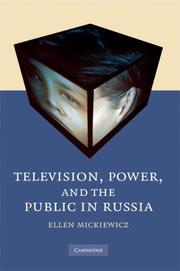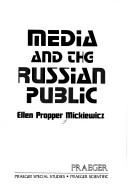| Listing 1 - 8 of 8 |
Sort by
|
Book
ISBN: 9780199977833 Year: 2014 Publisher: Oxford ; New York : Oxford University Press,
Abstract | Keywords | Export | Availability | Bookmark
 Loading...
Loading...Choose an application
- Reference Manager
- EndNote
- RefWorks (Direct export to RefWorks)
"What will the next generation of Russian leaders be like? How will they regard the United States, democracy, free speech, and immigration? What do they think of their current leaders? And what sorts of tactics will they bring to international negotiating tables, political and otherwise? Splinters in the Ice provides an engaging, intimate, and unprecedented window onto the mindsets of the next generation of leaders in Russian politics, business, and economics. In it, Ellen Mickiewicz, one of the world's foremost experts on Russian media, politics and culture, draws on interviews with students in Russia's three most elite universities, the training grounds for all of the nation's leadership. Allowing these students to speak in their own words, she shares their thoughts on international relations, the domestic and international media, democratic movements, and their government. She also shows how their total immersion in the world of the internet - an immersion that sets them apart from the current generation of Russian leadership and much of the rest of the country - frames the way that they think and affects their trust in their leaders, the media, and their colleagues. Mickiewicz also looks at the nation's recent protests and nascent political movements to show how they came about and to consider what promise, if any, they might hold for a more democratic Russia. "--
Political leadership --- Political culture --- Democracy --- College students --- Leadership politique --- Culture politique --- Démocratie --- Etudiants --- Attitudes --- Interviews --- Entretiens --- Russia (Federation) --- Russie --- Politics and government --- Politique et gouvernement --- Démocratie

ISBN: 9780521888561 0521888565 9780521716758 0521716756 9780511491016 9780511388507 0511388500 0511387512 9780511387517 9786611255206 6611255206 9780511384677 051138467X 1107187419 9781107187412 1281255203 9781281255204 0511382847 9780511382840 0511386508 9780511386503 0511491018 0511380690 9780511380693 Year: 2008 Publisher: New York ; Cambridge : Cambridge University Press,
Abstract | Keywords | Export | Availability | Bookmark
 Loading...
Loading...Choose an application
- Reference Manager
- EndNote
- RefWorks (Direct export to RefWorks)
The Russian media are widely seen to be increasingly controlled by the government. Leaders buy up dissenting television channels and pour money in as fast as it haemorrhages out. As a result, TV news has become narrower in scope and in the range of viewpoints which it reflects: leaders demand assimilation and shut down dissenting stations. Using original and extensive focus group research and new developments in cognitive theory, Ellen Mickiewicz unveils a profound mismatch between the complacent assumption of Russian leaders that the country will absorb their messages, and the viewers on the other side of the screen. This is the first book to reveal what the Russian audience really thinks of its news and the mental strategies they use to process it. The focus on ordinary people, rather than elites, makes a strong contribution to the study of post-communist societies and the individual's relationship to the media.
Télévision --- Télévision et politique --- Téléspectateurs --- Television broadcasting of news --- Television and politics --- Émissions de nouvelles --- Television broadcasting --- Politics and television --- Political science --- Television coverage of news --- Television journalism --- Television news --- Broadcast journalism --- Political aspects --- News --- Social Sciences --- Political Science

ISBN: 0030576814 0030576792 Year: 1981 Publisher: New York Praeger
Abstract | Keywords | Export | Availability | Bookmark
 Loading...
Loading...Choose an application
- Reference Manager
- EndNote
- RefWorks (Direct export to RefWorks)
316.774 --- Mass media --- -Mass media --- -Public opinion --- -#SBIB:309H1014 --- #SBIB:309H402 --- Opinion, Public --- Perception, Public --- Popular opinion --- Public perception --- Public perceptions --- Judgment --- Social psychology --- Attitude (Psychology) --- Focus groups --- Reputation --- Mass communication --- Media, Mass --- Media, The --- Communication --- Massamedia--(communicatiesociologie); technologische aspecten zie {659.3} --- Social aspects --- -Geschiedenis en/of organisatie van de media (met inbegrip van de rol van de media in de ontwikkelingsproblematiek) --- Media en publiekgroepen: gebruik van de boodschap, effecten van de media, ... --- Public opinion --- 316.774 Massamedia--(communicatiesociologie); technologische aspecten zie {659.3} --- #SBIB:309H1014 --- Geschiedenis en/of organisatie van de media (met inbegrip van de rol van de media in de ontwikkelingsproblematiek) --- Media en publiekgroepen: gebruik van de boodschap, effecten van de media, .. --- Media en publiekgroepen: gebruik van de boodschap, effecten van de media, . --- Media en publiekgroepen: gebruik van de boodschap, effecten van de media,
Book
ISBN: 0199977852 0199397066 Year: 2014 Publisher: New York : Oxford University Press,
Abstract | Keywords | Export | Availability | Bookmark
 Loading...
Loading...Choose an application
- Reference Manager
- EndNote
- RefWorks (Direct export to RefWorks)
What will the next generation of Russian leaders be like? How will they regard the United States, democracy, free speech, and immigration? What do they think of their current leaders? And what sorts of tactics will they bring to international negotiating tables, political and otherwise? This book provides an engaging, intimate, and unprecedented window onto the mindsets of the next generation of leaders in Russian politics, business, and economics.
Political leadership --- Political culture --- Democracy --- College students --- Government - Non-U.S. --- Law, Politics & Government --- Government - Europe --- Attitudes --- Russia (Federation) --- Politics and government --- College life --- Universities and colleges --- University students --- Students --- Self-government --- Political science --- Equality --- Representative government and representation --- Republics --- Leadership --- Education

ISBN: 1280524723 019802214X 9786610524723 0195362616 9780198022145 0195054636 9780195054637 0195063198 0197726216 Year: 2023 Publisher: Oxford : Oxford University Press,
Abstract | Keywords | Export | Availability | Bookmark
 Loading...
Loading...Choose an application
- Reference Manager
- EndNote
- RefWorks (Direct export to RefWorks)
Television has changed drastically in the Soviet Union over the last two decades. Ellen Mickiewicz's compelling volume challenges us to consider how television has become Mikhail Gorbachev's most powerful instrument for paving the way for major reform. Offering an insider's view into the world seen on Soviet TV, Mickiewicz explores the changes in programming that have occurred as a result of glasnost. Containing a wealth of interviews with major Soviet and American media figures and eye-opening accounts of Soviet TV shows, 'Split Signals' also compares over one hundred hours of Soviet and American television news programs broadcast during both the Chernenko and Gorbachev governments.
Television and politics. --- Television broadcasting. --- Television broadcasting of news. --- Television broadcasting of news - Soviet Union. --- Television broadcasting of news --- Television broadcasting --- Television and politics --- Journalism & Communications --- Journalism --- Politics and television --- Political science --- Television coverage of news --- Television journalism --- Television news --- Broadcast journalism --- Social aspects --- Political aspects --- News --- Soviet Union --- Politics and government --- Telecasting --- Television --- Television industry --- Broadcasting --- Mass media
Book
Year: 1967 Publisher: New Haven (Conn.) : Yale university press,
Abstract | Keywords | Export | Availability | Bookmark
 Loading...
Loading...Choose an application
- Reference Manager
- EndNote
- RefWorks (Direct export to RefWorks)
Civics, Russian. --- Kommunisticheskaia partiia Sovetskogo Soiuza --- Party work.
Book
Year: 1973 Publisher: New York Free Press
Abstract | Keywords | Export | Availability | Bookmark
 Loading...
Loading...Choose an application
- Reference Manager
- EndNote
- RefWorks (Direct export to RefWorks)
Book
Year: 1967 Publisher: New Haven, London Yale University Press
Abstract | Keywords | Export | Availability | Bookmark
 Loading...
Loading...Choose an application
- Reference Manager
- EndNote
- RefWorks (Direct export to RefWorks)
| Listing 1 - 8 of 8 |
Sort by
|

 Search
Search Feedback
Feedback About UniCat
About UniCat  Help
Help News
News